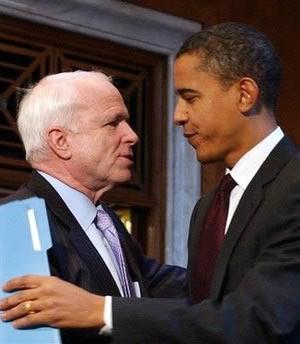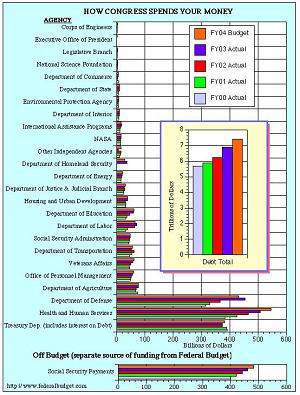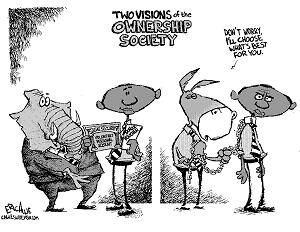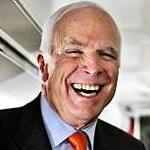
The Candidates 2008 and the Economy
Every three weeks leading up to this year’s presidential election, I’ll be discussing the various issues and what each candidate proposes for them. My plan is to evaluate the candidates—not on the basis of appearances, partisan posturing, or knee-jerk reactions—but on the basis of where they claim to stand. I’m going to assume that each candidate is telling the truth (unless it is demonstrably obvious that he is not), and I’m going to compare each candidate’s stands on specific issues against my own personal political beliefs. I’m not trying to tell you who to vote for, but I am trying to give you a clear idea of what the candidates promise, without the interference of partisan talking points, personal attacks, or journalistic advocacy.
 | | You can almost feel the love |
I’ve already covered scientific and domestic issues, and for this essay, I’m going to cover the economy. I know that economics is a mystical topic for most people—and politicians each have their own radically different interpretations of how the economy works—but I also know that the state of the economy often has more impact on presidential elections than any other issue. Only those with the biggest blinders on will tell you that our economy is in good shape today, as most of us can see that we are in the midst of a recession (though not by technical definition). Some people think it’s one of the worst recessions in recent history, while others think it’s a minor hiccup, but one thing is certain: people believe something must be done about it.
The thing is—and I know how cynical this sounds—I don’t put much stock in the idea that the president has control over the economy. Sure he has influence, and he can use that influence for good or ill. However, the great machine of the economy runs on all kinds of factors and is influenced by so many different things that no one man can truly fix or destroy it—not even the president of the United States. In truth, Congress has more control over the economy than the president. Additionally, today’s economic woes probably have more to do with gas prices—another mystical topic—and budgetary concerns than with any tax break, subsidy, or jobs package proposed by the man in charge.
Still, it is important to see what the candidates are proposing for the economy, how they plan to tackle the national budget deficit, how they plan to alter taxes, what they plan to do in the name of job security and poverty, and how they intend to fix the social security system. One of the biggest economic issues today—energy policy—will be covered in a future blog six weeks from now, but for now let’s put that aside and examine the candidates’ take on the rest of the economic spectrum.
The Budget & National Debt
 | | It's a few years old, but it's still illuminating (click to enlarge) |
Let’s face it, the national debt (currently approaching $10 trillion) is out of control, with the U.S. Government paying out over $400 billion a year in interest payments. Our budget in unbalanced, as year after year, the government spends more money than it acquires from the taxpayer. Nearly every president and congressman in the last fifty years (if not in the entire history of America) has promised to balance the budget and pay off the national debt, but none have actually succeeded. Some, like Clinton and the Congress under him, were able to get the budget into some semblance of control, but no president or Congress has been able to make much of a dent in the national debt or curb government spending. If you want my opinion, I’m on board the growing movement to propose a constitutional amendment that mandates the government to maintain a balanced budget that will slowly chip away at our national debt and make the United States a financially secure country, as we clearly cannot trust the government to do it on its own. My perfect presidential candidate would stand on a platform of eliminating a host of costly government programs, as they are the real source of the problem, and would demonstrate real ways—rather than just platitudes—to reduce government spending in all forms.
McCain has stated, “I will, as president, veto every one of these big spending bills. I will impose some fiscal discipline. We will clean up our act and we will regain the confidence of the American people as being careful stewards of our tax dollars, and we will fix this problem with having to borrow money from China, then we will balance our budget, just like every governor in America has been required to do.” He talks about reducing the $400 billion we dole out to oil-producing countries by being less dependant on foreign oil (more on that in a future blog), being more willing than our current president to veto “pork-barrel” spending bills, and supports the balanced budget amendment to the constitution. He claims to be able to eliminate $100 billion in government spending: $65 billion in semi-permanent yearly budget earmarks and $35 billion in “big spending bills in the last two years.” Though most analysts believe the $100 billion amount to be a gross exaggeration, it still is just a drop in the hat, as it is about a fourth of the aforementioned annual national interest payment or foreign oil cost. Still, he talks the good talk, and seems to be on the right track.
Obama, on the other hand, talks about cutting military spending by leaving Iraq (we currently spend only $12 billion a year in Iraq), adding red tape on credit cards (see the “Credit Card Bill of Rights”), accouting for every dollar of his rather expensive proposed programs, taking a long-term approach to solving the national budget and debt problems, rejecting free market thinking, and ending Bush’s tax rate cuts in order to give the government $150 billion more dollars. He voted against a rating system that would evaluate the effectiveness of government programs, is against the balanced budget constitutional amendment, voted against a $40 billion reduction in government spending (including Medicaid, Medicare, and obsolete hurricane relief funds), and also voted for reforming mortgage rules by adding more governmental control. I can’t even begin to explain all the problems I have with Obama’s economic vision here, but sufficed to say, I think he’s on the wrong track.
 | | That's not exactly what I meant by cutting spending |
If the budget and national debt were the only important issue, I wouldn’t hesitate to vote for McCain. He is eager to reduce spending more effectively than our current president has, wants to hold the government accountable for its finances, has proposed real ways to balance the budget by cutting expensive and wasteful programs, and supports a constitutional amendment that would solve a lot of the underlying problems. Obama wants to increase spending by adding more government programs to tackle domestic problems (including—but not limited to—the education, healthcare, and other concerns I talked about three weeks ago), and wants to reduce spending by cutting essential government programs like the military in a time of war. His voting record proves that he doesn’t like reducing spending or evaluating expensive programs, and for that reason, I don’t find any political common ground with him on this issue.
Taxes
I talk about government money as if there were a giant wallet in Washington full of $10 trillion in IOUs. The fact of the matter is that there is no such thing as government money; it’s actually our money, taken out of our paychecks and yearly income in the form of taxes. There are few issues more central to political thought than tax issues, as John Q. Voter tends to notice how his own wallet is affected by the government. Strangely, though, a huge contingent of the United States population actually wants to hand more money to the government, so that it can “fix” things like poverty and health care. Of course, I’m not one of these people; I think your money will do more good for the country if you burn it than if you hand it over to the men and women voting on their own payrolls on capitol hill. I know taxes are an inevitably necessary evil, but I think we already pay way too much. If we the people had more money (and by we, I mean all of us, rich and poor alike), the economy would flourish and prosper, and it doesn’t take an economics doctorate to understand that very basic concept. Therefore, I am for all tax breaks, rate cuts, and tax reductions, because the government has proven to me again and again that it is even more financially irresponsible than I am, which is quite the feat indeed. My perfect candidate would be one who would promise tax breaks and veto tax increases across the board, and it really is that simple.
 | | What really happens to taxpayer dollars |
McCain has promised to veto any tax increase passed by Congress. He did vote against Bush’s tax rate cut back in 2001 and 2003, but he claims he did it because it didn’t include any spending reductions (he approved of Reagan’s similar tax rate cuts back in the 1980s, because they included methods for reducing spending). He has since voted twice to make Bush’s cuts—which he voted against—more permanent, and has made little effort in explaining this apparent contradiction. Still, he has stated again and again that he wants taxes to be “low, simple, and fair,” that the system needs to be reformed because the people have no faith in it, and that he wants to focus his own tax cuts on the middle class or have a “flat tax” system implemented. He is a proud “Reagan Republican” when it comes to economics, believing that simplified taxes, lowered tax rates, and reduced government waste has made and will make for a prosperous and healthy economy.
Obama has described this style of economic philosophy thusly:
[The conservative ideal is] to give everyone one big refund on their government, divvy it up by individual portions, in the form of tax breaks, hand it out, and encourage everyone to use their share to go buy their own health care, their own retirement plan, their own child care, their own education, and so on. In Washington, they call this the Ownership Society. But in our past there has been another term for it, Social Darwinism, every man or woman for him or herself. It's a tempting idea, because it doesn't require much thought or ingenuity.
In short, Obama is, and proudly admits to being, a tax-and-spend Democrat. He believes that Bush’s economic policy has been a failure, and that McCain’s economic plan is too similar to Bush’s. Obama wants to (and has voted at least fifty times to) increase taxes for the rich, raise taxes for CEOs, expire the Bush tax rate cuts, and not raise taxes for people earning under $250,000 a year. He wants to raise the capital gains tax, though he claims it is an issue of fairness rather than revenue, and wants to use increased tax money from the rich to pay for health care and “other initiatives.” He voted against raising the death tax exemption (and against repealing the death tax altogether), voted against repealing the alternative minimum tax, voted against raising estate tax exemptions, and has repeatedly voted against making any tax breaks permanent. In short, Obama wants to raise taxes, mostly on the rich, in order to pay for a plethora of government programs.
Again, this is a no-brainer for me. I don’t believe that rich people deserve to be taxed more than middle class or poor people; it takes a certain kind of hatred and jealousy for successful people to even think that way. I also don’t think rich people are paying too little in taxes while middle class and poor people are paying too much, or that making rich people pay more will in any way help the economy (the upper class is as integral—if not moreso—to the economic welfare of the country as the middle class). In short, I don’t believe in class warfare; I think all people, regardless of their income, should be paying the same percentage amount in taxes, and I think right now, even after Bush’s tax rate cuts, the rich are floating the vast majority of the government bill. That’s why I latch on to McCain’s proposed flat tax, an idea that is not new or unique to McCain, but which has been repeatedly opposed by Democrats who thrive on the aforementioned class warfare. I also don’t believe a tax increase has ever boosted the economy, and with the current state of affairs, talking about tax increases, even if its only for the rich, is tantamount to talking about building a fire in a burning building. I don’t think Bush’s economic policies are the source of today’s woes, nor do I think McCain’s policies are too similar. I believe that McCain has the right ideas when it comes to taxes—reduce them for everybody—and I think that Obama’s proposals are dangerous and potentially disastrous. Additionally, I find it personally offensive that Obama doesn’t think I can be trusted to spend my own money.
Poverty & Unemployment
 | | Unemployment is sometimes the result of unexpected circumstance, like when whiny upstarts destroy the company headquarters |
Unemployment has been a critical issue in the past, and seems to be under the radar—for the most part—today. Still, it’s an important aspect of the economic system: the higher the unemployment rate, the more troubled the economy. According to government figures, the current rate (as measured in July) is 5.7 percent, with a total of 8.8 million people unemployed in this country. These numbers are much higher than they were a year ago (last July, the rate was 4.7 percent), but they are still lower than they were in 2003, when the rate went as high as 6.3 in June. From a historical perspective, the unemployment rate is lower and more stable, on average, than it has been in several decades, including the economically rich 1980’s (where it ranged from 5.0 to 10.8 percent). Under the Clinton administration, by way of comparison, the unemployment rate fell from well over seven percent to 4.2. For most of the Bush administration, the unemployment rate has remained relatively stable in the mid four to five percent range, a victory considering the turbulent times this decade has presented us with. Therefore, it is hard to say that jobs are a pressing issue, though the current economic troubles are threatening to make it so.
As I see it, unemployment is impossible to eradicate. There will always be a percentage of adults who choose not to work, including those who live on welfare, those who can’t find a job, those who become homeless, and those who become stay-at-home parents or parasites living off of the generosity of loved ones. Therefore, poverty will always be an issue, and any time the unemployment rate is under seven percent, things aren’t too bad. My ideal candidate, therefore, would strive to learn the lessons of recent history, both those under the Clinton administration and those under the current one. It is not essential to deal with poverty when so many other issues are precient, and there is no pressing need to radically reform the current welfare system at this time. Still, I know there’s no such thing as a candidate who will come forward and say he has no change in mind, and I know that there are people suffering in this country who think change is necessary, so let’s take an honest look at the ideas the current candidates have.
McCain, who claims that middle and lower-income families are being threatened by the current economic model, supports mandating that welfare recipients work 40 hours a week in work or training programs. He supports increased funding for child care programs, housing assistance for low-income families and welfare recipients, apartment vouchers for the homeless, food stamp programs for legal immigrants, and poverty aid through religious, secular, government and community-centered organizations. He wants to provide tax credits for companies that move into areas with high unemployment rates and companies that provide on-site child care services, reduce government regulations to encourage investment, and convert government-funded low-income housing projects into private housing, managed and owned by the residents. He voted against eliminating block grants on food stamps, voted for allowing state welfare waivers, and voted for an overhaul of the entire welfare system.
 | | Political cartoon by Eric Allie |
Obama has plenty of ideas as well. He wants to cut poverty in half in ten years with faith-based organizations, wants to create twenty “promise neighborhoods” in cities with high poverty rates, wants to increase the involvement of faith-based organizations in all aspects of his public service, is against the idea of an “ownership society,” promises to end tax breaks for companies that export jobs while increasing tax rewards to companies that create jobs here at home, and wants to spend large amounts of federal money to combat global poverty. Still, his Congressional voting record is unproven at this time (length of service is an important factor), though his state voting record has proven his desire to provide large amounts of tax relief for working families.
While Obama is more specific about his goals than McCain, I feel like Obama’s ideas aren’t as clear or numerous. I’m also wary of Obama’s sole reliance on faith-based organizations, where McCain wants to utilize as many organizations as possible to reduce poverty and unemployment. I also don’t like Obama’s desire to spend even more money to deal with global issues (when he himself runs on a campaign of dealing with the problems at home) or his insistence that the “ownership society” is a bad idea. I don’t think, however, that the welfare system has to be reformed as thoroughly as McCain wants it to be or that the middle class is as threatened as he claims it is. I’m giving this one to McCain because I think he has more ideas and more rational plans than Obama, but I still don’t really think he gets it right.
Social Security
It’s a saying in my generation that more people believe in UFOs than in social security. I don’t believe in either, really, but I’m willing to say I’m more likely to believe in aliens than in getting a social security check when I retire. No matter how you look at it, social security is probably the biggest Ponzi scheme in history—the idea of taking money from one person to pay another—and is built on the principal that people aren’t smart enough to save their own money. Social security is not part of the general fund, but is its own separate trust fund. In theory, the government should never touch this money, as the money being put into it will eventually be paid out to people as they get older. However, there is more money being paid into the trust fund than is being paid out—as should be expected—and the government is stealing the surplus and leaving IOUs behind. When more money needs to be paid out than is going in—which is going to happen awfully soon—we’re in deep doo-doo. In effect, social security, though it isn’t part of the national budget, winds up being a drain on the national debt and the economy. In short, as far as I’m concerned, the entire social security infrastructure needs to come down, and every cent that everybody put into it needs to be paid back as soon as practically possible, because once again, the government has proven that it cannot be trusted with our money. Sure, that forces the government to cut even more of its spending in order to afford it, but so be it. My ideal candidate is one who takes steps to kill social security, not just reform it or reimagine it.
The Libertarian Perspective
Bob Barr wants to remove earmarks and cut spending in order to balance the budget and pay the national debt. He has also voted to offer a $3 contribution on your 1040 form to help pay the debt. His take on taxes is refreshing; he wants to radically simplify the tax system and reduce taxes across the board, and has voted for every tax cut that has come before him. He wants to limit welfare to 2 years and curb welfare spending, and has supported the effort to privatize social security, though he voted against increasing the rules keeping the government from using social security funds.
 While I’m with him on cutting spending, simplifying the tax code, and cutting taxes across the board, I find his take on welfare downright cruel (though perfectly in line with extreme Libertarian ideals) and his stance on social security a bit weak. If the economy were the only relevant issue and I were choosing between all three candidates, I still wouldn’t pick Bob Barr. While I’m with him on cutting spending, simplifying the tax code, and cutting taxes across the board, I find his take on welfare downright cruel (though perfectly in line with extreme Libertarian ideals) and his stance on social security a bit weak. If the economy were the only relevant issue and I were choosing between all three candidates, I still wouldn’t pick Bob Barr.
|
McCain supports an honest and bipartisan reform of the social security system. He admits that social security is going broke and proposes that personal savings accounts, ones that the government can never touch, are the beginnings of a solution. He promises to take every dollar of social security off-budget, without excuses (disallowing even “emergency” spending), and to reserve sixty percent of the surplus to save social security within his first year of office. He also calls for a removal of the earnings test, a method whereby elderly workers who do not retire do not receive social security. However, he did vote to use the social security surplus to fund tax breaks in 1999, though he has since voted to allow personal retirement accounts and income tax deductions on social security payments.
Obama is firmly against privatizing social security in any way, and wants to continue to make retirement savings automatic. He is against social security reform, though he claims it is important to him that everybody be given the money they deserve when they get older. He doesn’t want to cut benefits or raise the retirement age, but the only way he offers to put more money into the social security system is by making the wealthy pay more and raising the cap on payroll taxes. He voted against ensuring that the promised benefits for individuals born before 1951 remain unchanged, against private savings accounts, and against rules mandating that social security surpluses remain off-limits for the federal government.
If social security were the only important issue to me, I’d vote McCain. Sure, he doesn’t want to dismantle the entire system, but he does want to make it more private and restrict government interference. Obama, on the other hand, wants to keep this broken system exactly as is, though he promises without explanation that people will get paid in the end. Under Obama’s plan, nothing will change, and both the budget and the national debt will get more and more out of control in order to pay for social security when the fit hits the shan.
My Choice if the Economy were the Only Relevant Issue
  |
| The Candidates and My Vote |
  |
|
This is the first time my choice has been this obvious, and frankly, I am surprised by how obvious the candidates are making it. McCain wants to cut government spending, lower taxes across the board, and save social security. Obama wants to spend money, raise taxes, increase class warfare, and continue the broken system of social security as if nothing were wrong with it. This one is a no-brainer.
Still, I know there are people out there who think raising taxes and increasing government spending are the way to go. There are people who think giving the majority of their paycheck to Uncle Sam so that he can be in charge of everything from retirement to health care is a pretty good idea. If you’re one of them, maybe you should consider voting for Obama, but as far as I’m concerned, the only way we’re going to have a healthy, stable, and prosperous economy is if we can actually keep our money, stop biting the wealthy hands that feed us, curb out-of-control government spending, and make the system as fair as we can. McCain and I clearly see eye-to-eye on this one.
If you disagree with me (or even if you agree), feel free to add comments below. Otherwise, check back in three weeks when I’ll outline The Candidates and Civil Rights.
-e. magill, 08/11/2008
|
|